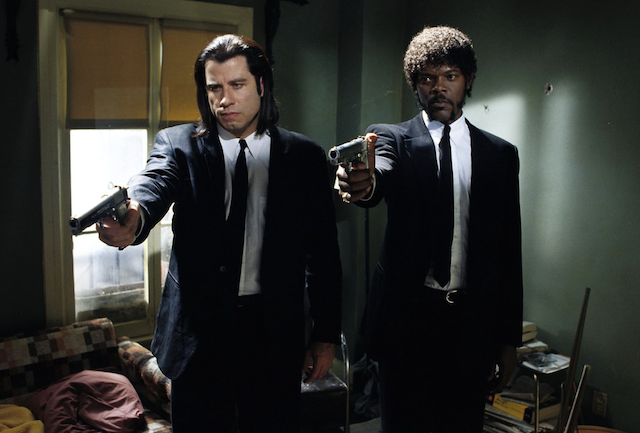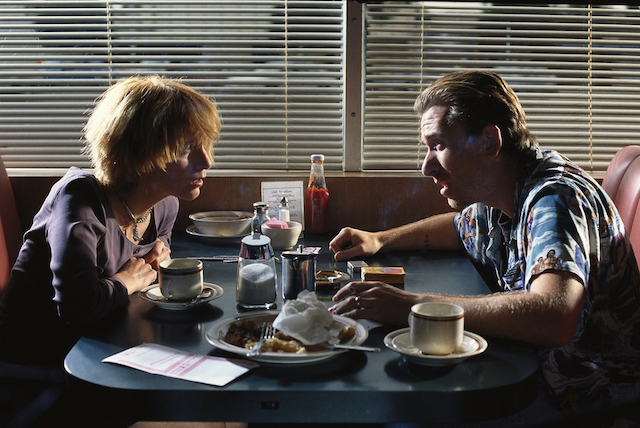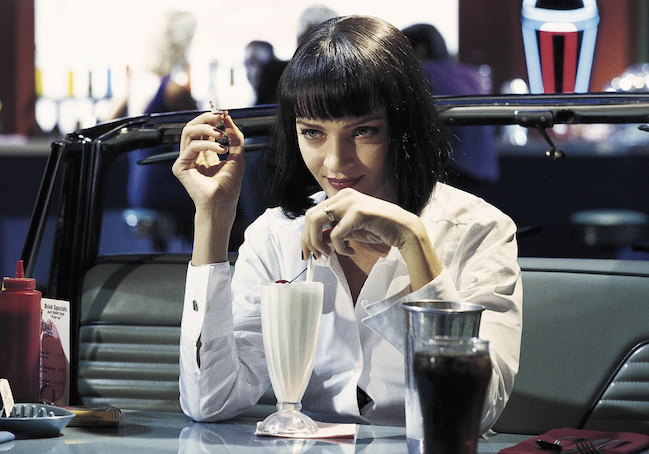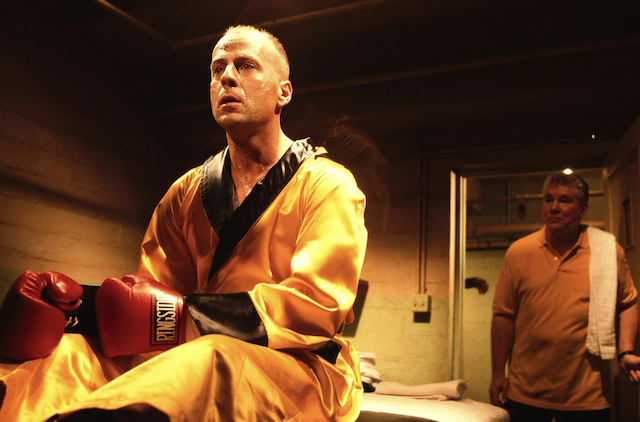
@Courtesy of Miramax
It is quite fair to write that Quentin Tarantino owns his astonishing career, or at least a good part of the way it was shaped, to…Clint Eastwood. The legendary actor and director who was designated President of the Jury at the Cannes Film Festival in 1994, imposed in fact his will upon the other members, assigning the Golden Palm to Pulp Fiction while most of them wanted to reward Caro Diario by Nanno Moretti, which in the end got the prize for Best Directing.
That day, exactly May 23rd, 1994, the world officially “discovered” the most acclaimed, discussed, irreverent movie of the decade. Two years earlier Tarantino had already made a name for himself among a small bunch of cinephiles thanks to his first feature film Reservoir Dogs (starring Harvey Keitel, Steve Buscemi, Tim Roth, Chris Penn, and Michael Madsen), but it was Pulp Fiction that truly created the director’s icon as the most provocative, violent, iconoclastic artist of his generation. The Award journey started in Cannes and ended for Tarantino with an Academy Award for Best Original Screenplay – shared with Roger Avary – while Pulp Fiction, despite seven nominees, fell short of winning Best Movie of the Year defeated by Forrest Gump by Robert Zemeckis.
Three decades later, can we confirm Pulp Fiction deserved all that incredible amount of success? Absolutely. It opened the door to a new way of perceiving genre movies, screenwriting, and dealing with violence on the big screen especially when it is mixed with irony. Quentin Tarantino wholly embraced, perhaps even created a less serious approach to that same material that in the ’70 and ‘80 was used by stars like Clint Eastwood, Sylvester Stallone, Arnold Schwarzenegger, or on a different productive scale Chuck Norris for their serious, conservative action movies.

@Courtesy of Miramax
Through Pulp Fiction, Tarantino showed instead that violence could be exposed in a still powerful but also weird way: a gunshot could be not only the necessary act of “heroes” with a personal, strong moral code but a random, gory accident caused by silly, logorrheic, psychopathic characters that the audience couldn’t avoid to root for anyway. Daring to show the blood of that same action, mixed with an unprecedented taste for dialogue, the author created a formula that many – maybe too many – other directors used in their movies since then. Pulp Fiction opened in fact the door to a series of wanna-be feature films trying to emulate the original, of course in vain.
“The path of the righteous man is beset on all sides by the iniquities of the selfish and the tyranny of evil men. Blessed is he who, in the name of charity and goodwill, shepherds the weak through the valley of darkness, for he is truly his brother’s keeper and the finder of lost children. And I will strike down upon thee with great vengeance and furious anger those who attempt to poison and destroy my brothers. And you will know my name is the Lord when I lay my vengeance upon thee!”
The sequence where Samuel L. Jackson plays the legendary monologue is most likely the essence of Pulp Fiction: a stunning milkshake made of absurd lines, cinematic tension, graphic violence, and a twisted, almost delirious sense of joy. “It changed my life drastically,” said the actor not long ago celebrating the 30th anniversary of the movie for which he achieved his only Academy Award nominee “I think this was the particular role that all of a sudden people started thinking I was the coolest mother f—er on the planet. So, I’m happy with that.”
A few days ago, in a video that went viral on the internet Jackson showed that at the age of 75, he can still play the whole monologue like he did three decades ago. What does it say about Quentin Tarantino’s capacity to write memorable dialogues for his actors? Because if it’s true that Tarantino didn’t create anything new with Pulp Fiction, at the same time he mixed many different influences from past cinema (especially the glorious B-movies he loved so much when he was a teenager) with an audacity and a personal touch that are still today incomparable.
Quentin Tarantino and his first masterpiece are not innovators because they brought on the big screen something never seen before, but because they elevated that same material to another level of cinema, a level that includes a specific vision, an even more specific tone of storytelling, and finally the sheer will to have fun with the audience about breaking the rules – or should we call them stereotypes? – applied to “good movies’.

@Courtesy of Miramax
There is also another element that many could perceive as weak in Pulp Fiction but in our opinion, it is actually a remarkable achievement for Quentin Tarantino: the movie aged. Not little by little but all of a sudden, specifically when it turned 25 in 2019. That’s when the director realized his last Once Upon a Time…in Hollywood, something that poetically closes an artistic journey that Pulp Fiction started.
All the playful fantasy, all the gory elements, all the bloody appetite for an era of movies and violence and exploitation that he previously showed, in his last movie becomes surprisingly a melancholic ballad about friendship, hopes, and dreams. For the first time, Tarantino also rewrote his own version of “History” to save the life – and preserve the innocence – of one of his main characters, ideally erasing the horrible crime that in 1969 ended forever a certain perception of Hollywood and the so-called “American Dream”.
There is something incredibly endearing at the end of Once Upon a Time…in Hollywood, and perhaps it’s so moving exactly because it’s the same director who realized Pulp Fiction: thirty years ago he shocked us with that brutal, jovial exposition of fictional violence. But when it’s about showing the real slaughter of Sharon Tate and the other victims on August 9, 1969, Quentin Tarantino chooses instead of saving her, just to prolong at least in his movie an era that he (and all of us movie brats) loved so much.
This way Pulp Fiction – as much as Kill Bill, Inglourious Basterds, Django Unchained, and all his other movies – is relegated to the past. Finally, as it actually deserves. The flamboyant performances by Samuel L. Jackson, John Travolta, Uma Thurman, Bruce Willis, Harvey Keitel, Maria de Medeiros, Tim Roth, Amanda Plummer, Ving Rhames and all the other members of the cast; the raging editing by Sally Menke; the iconic set designing by David Wasco; the outrageous cinematography by Andrzej Sekula; all of this seems to finally be in the past.
This makes Pulp Fiction even more precious because now it can be analyzed as the incredible beginning of an artistic path that has finally let the audience see a glimpse of the human behind the genius. Waiting to know if Quentin Tarantino will ever direct another movie, we can today acknowledge that Pulp Fiction has achieved its own place in movie history. Actually a different one, maybe less as an object of cult but more like the first piece of a hypnotic cinematic puzzle. All that we experienced thirty years ago was an explosion of surreal, grotesque fantasy, something that every movie lover has to be grateful for, knowing that its creator finally moved on. In his own crazy way, no doubt about that…

@Courtesy of Miramax
If you like the articles, share your thoughts below!
Check out more of Adriano’s articles.
Here’s the trailer for Pulp Fiction:

